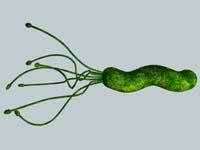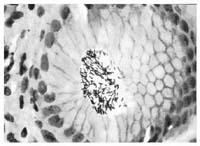Deep ulcer ulcer
2005/11/16 Galarraga Aiestaran, Ana - Elhuyar Zientzia

Until Warren and Marshall showed that the ulcers are caused by bacteria, doctors believed that the disease was a consequence of stress, inadequate life, and spicy meals. And, undoubtedly, these factors are not beneficial either for the stomach or for the health of the whole body. But they are not the main causes, but a bacterium: Helicobacter pylori.
Warren first discovered the bacterium. Warren was born in 1937, in Australia, where he studied medical studies. After his entry into the Melbourne hospital, he moved to Perth Hospital in western Australia. There, in 1979, he first discovered that there was a wrong bacterium in a gastric mucosa biopsy.
One begins the way, the two advance

Warren first realized that there was a wrong bacterium in gastric mucosa biopsies in patients with ulcer. (Photo: www.helico.com.au)
During the following two years he studied numerous biopsies and almost always found this bacterium in biopsies of patients with gastritis or gastric inflammation, as well as those who had ulcer. Therefore, he concluded that there was a direct relationship between the bacteria and the disease.
However, the rest of the doctors did not fit the consequences of Warren. The pH of the stomach is 2. This means that it is extremely acidic and they believed that the growth of microorganisms in such acid medium was impossible.
Warren, however, stayed with the bacterium and continued to study its action. In 1981 he met Marshall and since then they have been working together. Marshall, also an Australian, born in 1951, suspected that upon learning of Warren's investigations he was on the right track.
Between them the bacteria was isolated and raised in the laboratory, observing that it was an unknown species until then. They called Helicobacter pylo. In addition, they demonstrated the direct relationship between bacteria and ulcers. Precisely, the bacterium Helicobacter pylori is responsible for 80% of stomach ulcers and 90% of duodenum ulcers.
Marshall and Warerne conducted numerous experiments to demonstrate the relationship between H. pylor i and ulcer. It should be noted that in one of them Marshall was used to experiment. He deliberately took the bacteria to get sick and when he got what he wanted, that is, when he got sick, he took antibiotics. And it was cured!
Extended infection
Helicobacter pylori is a bacterium that only attacks man and there are many people infected. It extends especially in developing countries, almost all adults have bacteria in the stomach. About 10% of children between 2 and 8 years of age get infected a year, so for children about 10 years of age almost everyone has infection.

However, the infection is not so widespread in developed countries. On average, half of the population is infected, but especially people over 60 years of age and of low socio-economic level.
Researchers still do not know how it is contagious. It is reportedly transmitted through food or water with traces of feces, but they suspect it can also be spread from mouth to mouth. In fact, 30% of the infected have bacteria in the dental plaque, so it can also be transmitted through the kisses, for example.
However, not all those affected develop the disease, only 10-15% of those infected suffer from ulcers or gastritis at some time. On the other hand, Helicobacter pylori is not the only causal agent, since some drugs also cause ulcers, such as aspirin and non-steroidal anti-inflammatory drugs.
Well adapted bacteria
Helicobacter pylori is a bacterium specially adapted to live in the acid environment of the stomach. It should be noted that more than two liters of gastric juice a day impregnate the stomach. Gastric juice contains digestive enzymes and concentrated hydrochloric acid, which allows to remove the hardest foods and destroy viruses and bacteria. Except one.

A gastric gland (Photo: www.helico.com.au)
Gastric juice could also digest the stomach if the stomach was not protected. But it is well protected because it has a thin layer of mucus covering the entire gastric wall. This prevents the acid liquid from destroying the cells of the wall, where the bacterium Helicobacter pylori is protected.
Protected in mucus, the bacterium creates a basic environment around it to neutralize the acidity present in the environment. For this purpose, it has an enzyme, urease. Urease divides the urea present in gastric juice, forming bicarbonate and ammonium, both very basic. This reaction is important for the diagnosis, as it is possible to detect it in the oral respiration.
In addition, Helicobacter pylori has the advantage of hiding in mucus: the body's immune system cannot reach it. And the body responds to the infection by sending specialized cells (T cells) and other agents, but since they cannot be put into the mucus, they die.
However, the body continues to fight and also sends substances to feed specialized cells, but it takes advantage of the bacteria. In a few days, inflammation (gastritis) and sometimes ulcer appear. According to some researchers, the bacterium may not induce the ulcer directly, but is a product of inflammation.
Diseases related to H. pylory

Although the bacteria were not a direct agent, it is shown that there is a close relationship between bacteria and various stomach diseases. And yet, many of the infected do not have any symptoms. In them no antibacterial treatment is performed, except in cases where a family member of the infected suffers from stomach or digestive tract cancer. In fact, the massive use of antibiotics can pose a high risk of resistant bacteria.
Many of the infected are asymptomatic, but most of those who have ulcer are infected. Some have gastric ulcer and other duodenal ulcer. Duodenum is the first part of the small intestine and is between 2 and 5 centimeters below the end of the stomach.
If duodenal ulcer is treated with antacids, once it has stopped taking the drugs, it will appear again. If the bacterium Helicobacter pylori is eliminated by antibiotics, the ulcer is completely cured. This demonstrates a close relationship between ulcer and bacteria.

In the case of stomach ulcers, antibiotics can be useless. In fact, although in most cases they are related to the bacteria, 30% of ulcers are due to medications such as aspirin. And in the latter, antibiotics do not solve anything. Therefore, before applying the treatment, a diagnosis must always be made.
On the other hand, chronic ulcer increases the risk of developing a type of lymphoma and stomach cancer. And, precisely, among the most lethal cancers, the stomach occupies the second place. However, in recent years, cases of stomach cancer have been significantly reduced due to adequate treatments.
It cannot be denied, medicine owes much to Marshall and Warren. Thanks to them, doctors now know that antibiotics are effective in curing ulcers. In passing, the destruction of the bacteria reduces the risk of the occurrence of other diseases. Therefore, in December they will receive a well-deserved prize.




